#john grisham
Text

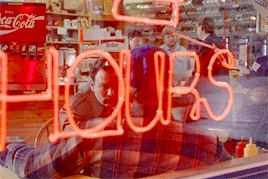



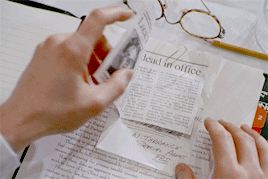
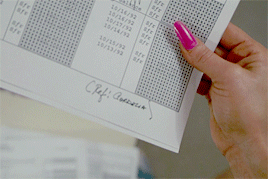



The Firm (1993)
#The Firm#filmedit#Tom Cruise#Jeanne Tripplehorn#Gary Busey#Sydney Pollack#John Grisham#my gifs#movie gifs
163 notes
·
View notes
Text

I'm gonna die laughing
257 notes
·
View notes
Text

Black Oak Arkansas
#black oak arkansas#jim dandy#jim mangrum#james mangrum#john grisham#music legend#guitars#drums#love#arkansas
12 notes
·
View notes
Text
“Quitting is not the answer. Life is not fair, and you can't quit every time something unfair happens to you.”
― John Grisham, The Activist
#college#college life#studyblr#book quote#motivating quotes#study motivation#john grisham#slavic roots western mind
9 notes
·
View notes
Text
Resenha Dossiê Pelicano
Dossiê Pelicano, escrito por John Grisham, publicado pela primeira vez em 1992, ganhou uma adaptação em 1993, descrito como de gênero romance, ficção, thriller jurídico, mistério e literatura jurídica, e com o total de quarenta e cinco capítulos.
Bom para quem já me conhece sabe só por essa ficha técnica que não é um livro da minha área de preferência kkkkk. Confesso que não foi tarefa fácil começar a ler o livro uma ressaca literária terrível e pouquíssima animação, para ler um livro de cunho jurídico me abateram. Mas finalmente deixei a preguiça e a ressaca de lado e depois de ler 4 vezes o primeiro capitulo foi que então comecei minha jornada em Dossiê Pelicano.
Primeiro de tudo eu estava confusa com a história, o livro apresenta o ponto de vista de vários personagens para narrar a história, cheguei a comentar com meus amigos "hora eu sei quem está narrando, hora eu não faço ideia mas sigo com a leitura mesmo assim". e como isso obviamente temos vários personagens importantes, começando por Darby Shaw uma estudante de direito, quem escreveu o bendito Dossiê, apelidado pelo FBI de Dossiê Pelicano. Aí temos, Thomas Callahan, professor de direito constitucional de Darby, que creiam amigos com quarenta e cinco anos (dois a mais que o próprio pai de Darby) namora a garota de 24 (que Callahan diz ser muito madura para a idade, sentiu nojo? Por que eu senti), aí logo tempo uma breve aparição de dois juízes da suprema corte (que serão a causa do Dossiê pois mal aparecem e são mortos) Abraham Rosenberg e Glenn Jensen. Temos também Fletcher Coal, assistente, manipulador e guarda costas do presidente dos EUA, O próprio presidente (que se apareceu o nome dele nem chego a me lembrar, só o chamam de presidente o livro todo), aí vem o FBI entre muitos agentes o principal nome entre eles é F. DentonVoyles, e da CIA temos como principal Gminski (me pergunta se eu sei pronunciar esses nomes, kkkkkkkkkk, não.) Em seguida mais para a metade final do livro conhecemos Gray Grantham (jornalista do Washington post), Gavin (amigo de faculdade de Thomas e atualmente trabalha como advogado, se não me engano, para o FBI). E finalmente chego ao ponto de vista que achei o mais sensacional de todos, (o assassino dos juízes) Khamel.
E a história é mais ou menos assim:
Rosenberg e Jensen são assassinados, ambos juízes da suprema corte, Rosenberg era uma lenda, Jensen era um juiz novo e indeciso de que lado ficar, mas ainda sim um juiz da suprema corte, os EUA entram em desespero, quem os matou? Por que? Como ficaria a nova configuração da corte? E em meio a isso o presidente e seu cérebro externo "Coal" querem aproveitar a oportunidade da crise, um ano antes da eleição, para deixa a câmara o mais conservadora possível e garantir assim votos. Os alunos de direito do país todo parecem querem brincar de investigadores e entre esses se encontra Darby. Que escreve um dossiê com sua suspeita de quem matara Rosenberg e o deixa para Callahan ler certa noite, o professor que ficou abalado com a morte da lenda do direito constitucional, gosta da aposta de Darby para tal mandante do crime e leva o dossiê para uma amigo que trabalha para o FBI(Gavin), nas mãos desse amigo o dossiê para na mesa do chefe do FBI ( Voyles) que por sua vez, meio que para brincar e assustar o presidente deixa uma cópia para Coal e o presidente, não dando muita bola para esse. A informação sobre a existência de tal dossiê se espalha e chega aos ouvidos de alguém envolvido com ele. Ai as mortes começam, na tentativa de se livrarem de Darby, Callahan é quem vem a óbito, a estudante e enlutada namorada se sente ameaçada. Enquanto o FBI ainda trata o dossiê como brincadeira Darby tenta sobreviver noite após noite sendo perseguida por assassinos.
Ao meu ver os homens de Dossiê Pelicano são nojentos e diversas cenas provam meu ponto de vista, a começar pela fala de Callahan sobre Darby, do plano de de apresentar a jovem para o amigo Gavin, em uma ida a praia para ambos apreciarem a jovem de biquíni, a "decepção" de Gavin ao ouvir a jovem comentar sobre seu peso ao telefone e ela a achar gorda, a fascinação que todos os homens que veem a foto dela demonstram ter por ela e por muitas vez aparecer o pensamento deles sobre como esta seria por debaixo das roupas, e nem mesmo o assassino chega a escapar de tais pensamentos.
Darby é uma personagem mal aproveitada, mesmo estando ela o tempo todo no meio da trama, chega a ser uma personagem sem graça. Pouca personalidade, apesar de que gostei dela e de suas escolhas até certo ponto, é uma personagem sem sal poderia ter feito mais, de dez pontos eu dou um oito para ela.
Khamel foi um de meus personagens favoritos, acho que foi pelo simples motivo de ser ele o assassino kkkkkk ele tem um passado misterioso e muitos anos no ramo, acho que isso o deixou legal.
Voyles também foi um personagem legal, gostei do jeito esquentado dele e do ranço que ele demonstra ter por Coal, era divertido ler esses dois discutindo.
Achei o romance (entre personagens) fraco, e o final do livro chato. Talvez se tivesse terminado com uma morte "em especifico" teria terminado melhor. Mas sempre levando em conta que suspense não é minha área literária favorita kkkkk gosto muito mais de aventuras, fantasia, ficção e distopias, então pode ser que muitos venham a gostar dos pontos que eu achei fracos. Apesar de toda a crítica que fiz ao longo da leitura, eu dei uma nota 8 para o livro, foi bom para sair da ressaca literária, me deixou ansiosa pelo final (mesmo não terminando tão bem quanto o esperado) e me rendeu uma boa conversa no final da aula um dia desses.
-Tainá
Próxima resenha: Bastardo Grego de Juliana Dantas por Nick
22 notes
·
View notes
Text
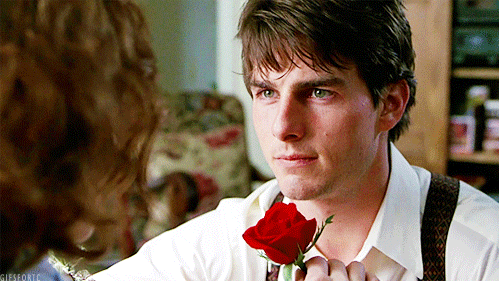
THE FIRM. Dir. Sydney Pollack, 1993.
23 notes
·
View notes
Text
Wild how 90s Hollywood went absolutely mad for John Grisham
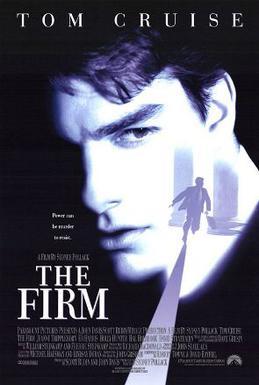
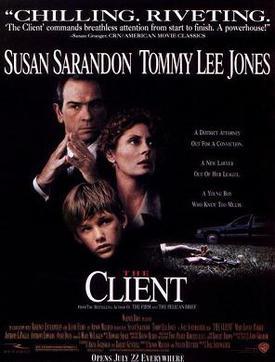

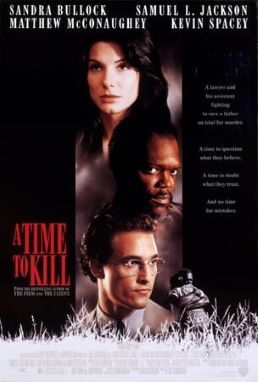
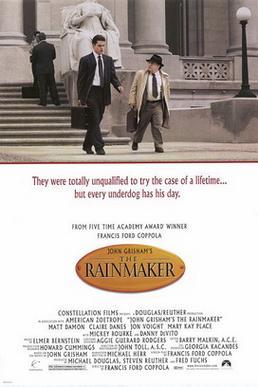
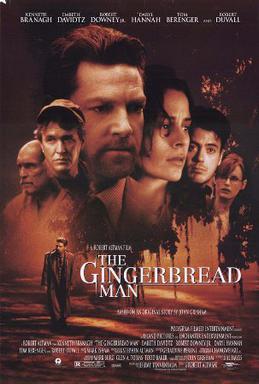
#john grisham#the firm#the client#the pelican brief#a time to kill#the rainmaker#the gingerbread man
3 notes
·
View notes
Photo


Fin de siglo (2019) by Lucio Castro
Book title
El regreso de los conejitos suicidas (Return of the Bunny Suicides in English; 2004) by Andy Riley
Alrededor de la Luna (Autour de la Lune in French; 1870) by Jules Verne
Veinte mil leguas de viaje submarino (Vingt mille lieues sous les mers in French; 1869) by Jules Verne
The King of Torts (2003) by John Grisham
De la Tierra a la Luna (De la Terre à la Lune Trajet direct en 97 heures in French; 1865) by Jules Verne
#fin de siglo#end of the century#lucio castro#books in movies#french literature#autour de la lune#jules verne#alrededor de la luna#the king of torts#john grisham#american literature#de la tierra a la luna#De la Terre à la Lune Trajet direct en 97 heures#Veinte mil leguas de viaje submarino#Vingt mille lieues sous les mers#return of the bunny suicides#andy riley#El regreso de los conejitos suicidas#english literature
17 notes
·
View notes
Photo
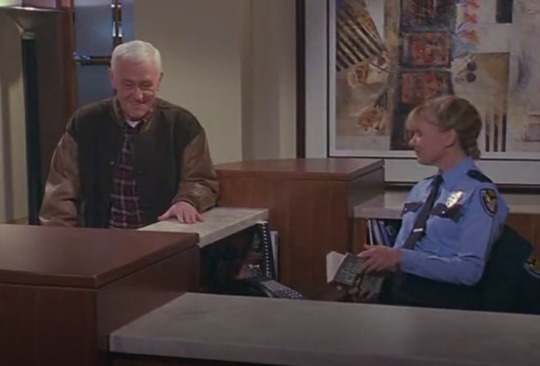
The Client by John Grisham
Frasier: "Juvenilia"
3 notes
·
View notes
Text
Calatonia Artica Vibes!

Make up Artist for the New Moon Theater: Artica, please put that novel down and focus on me! I need to make you look presentable!
Artica: But, madam, Luther is about to learn why you can’t just skip a holiday just because it’s too expensive!
And yes, Christmas With The Kranks was a book before Columbia Pictures turned it into a classic film.
#sing 2021#sing 2016#sing artica#john grisham#this post won’t let me upload the original cover#so I have to tell you that the original title for Christmas With The Kranks is Skipping Christmas#alvin and the chipmunks#simon seville
4 notes
·
View notes
Text
Invisible Authors
I wish I was as successful as Richard Castle. He has a fabulous NYC apartment, another home on the coast and he spends money without having to think about the cost or value.
There are a few authors whose books have made them rich (over $20m in 2018 alone), such as JK Rowling, Stephen King and John Grisham but, in reality, the top 10% of writers account for 70% of all income from books and less than 14% of authors can rely on writing as a sole source of their income.
A survey was carried out by the University of Glasgow of 50,000 authors' earnings this century. From an average author income of £18,013 in 2006, it fell by 52.65% to £10,497 in 2018. I began writing in 2019 - great timing, eh?
But I'm not doing this to make millions, although covering costs is good. When one plans retirement, they often take up painting or, in my case, writing. Any profit I receive from selling my books is carefully calculated each year (income declared, of course) and 50% of those profits are donated to a charity for the homeless.
If you are considering self-publishing, here is an article you might find interesting. I wish you the very best of luck with your writing and publishing.
#kindle books#fiction#indie author#new novel#amazon books#new book release#book review#richard castle#john grisham#stephen king#j k rowling#novel writing#creative writing#authors of tumblr#author tips#self publishing#writers
4 notes
·
View notes
Text
"The Firm" (1993) review
*Baby's first published movie review
*At least 90s Tom Cruise is the height of pretty.

Right out of the gate, I can tell you that this wasn’t the worst movie I’ve ever seen. It had a few good points for sure that I appreciated- I thought Jeanne did a respectable job as Abby, and girl was serving even at the funeral with that hairbow. Holly was also criminally underused as Tammy, who was my second favorite character in the book to Mitch. I missed queen Tammy. The autumnal aesthetic was also popping off and made me wanna eat some crunchy leaves. The jazzy soundtrack was good as music in itself, but a confusing choice for this movie that did not fit the mood and kept making me think I was watching “When Harry Met Sally.”
And that’s the extent of my praise; time to roast now. This movie is, I think, one of the most significant examples of why book-to-movie adaptations are always cause for some level of alarm. I could feel the filmmakers’ contempt for the source material emanating from the screenplay. The way that they were changing things even as minute and unnecessary as characters’ last names (Hodge/Hodges, Knauss/Krauss) and hair colors (Abby and Tammy are both magically redheads) just for the sake of changing them. And that’s to say nothing of the way the movie versions of the characters are devoid of any sense of nuance, and weirdly, sin? In the book, Mitch was a really interesting and relatable character because he was a person with flaws and inner moral conflict. He cheated on his wife (in a slimier way in the book too, I might add- no white knight scenario where he saves the girl and tends to her injuries) but never ended up confessing it to her, instead choosing to live haunted with the secret. He’s also a lot more demanding about money from the FBI and steals some extra from the firm as well, while in the movie he just gets a half a million and calls it a day. Additionally, he has a thinly veiled hatred for Abby’s parents and the book goes into much more detail about his own estranged family. Finally, his motivation for taking down the firm in the book is mostly about saving himself and the few he cares about, and less about going on some one-dimensional moralistic crusade full of monologuing about justice and the wonders of the legal system. But all of these flaws are what made Mitch human and his story interesting to follow. For me, personally, it’s not at all intriguing to watch a ~good character~ do ~good things~ out of ~good intentions~. Somewhat related but kind of opposite is also what they did to Avery- he was great in the book as the hedonistic loose cannon with no scruples who was slowly spiraling. And then in the movie they thought it was a good idea to throw in some weird redemption arc where he ~shows remorse for his misdeeds~ that felt so forced. Plus, this is me being picky, but Gene Hackman as a womanizing dilf was just not doing it for me.
Then there’s the plot, which had perhaps the most egregious of all the artistic blunders. Who on God’s green earth’s idea was it to water down all of the crimes Mitch had uncovered that the firm and the frickin mafia were accused of to… overbilling? The only thing Mitch gives the FBI proof of is that the firm was overbilling their clients? And then the mafia never gets prosecuted at all?? And this is noble and good for some reason because Mitch heroically refuses to violate attorney-client privilege and be disbarred, which in his state does not include if one’s client is committing illegal acts anyway so he could have literally turned over the mafia and still retained his damn license??? And this is also all on the premise that is trying so hard to be deep and edgy and philosophical: “well who’s really the bad guys, the mafia or the lawyers who protect them, huh?” Bro really thought he had something there but, um… both? It’s both. Oh, and then there’s no consequences for any of the information Mitch has given and the people he’s crossed, unlike in the book where he has to start all over in the middle of nowhere and leave everything behind, on the bad side of both the mafia and the government. In the movie, and I wish I was joking, he and Abby just hop right back into their old dinged-up car from the beginning and move happily to Boston like “Wow, that was a weird few months.” Ummmm... huh???
Overall, speaking of bad guys and their evil doings, the sense of dread, malice, and suspense that pervaded the book is just not there. I was constantly troubled by the feeling that something was Not Right, but didn’t know what, over the first big chunk of the book, and then once you know what’s going on, the stakes are so high and there is such a complex web of characters and their motivations and goals that you can hardly stand the stress and excitement wondering what will happen (which you do not feel sure about until the very last page). Sharing much less sensitive information and being on the bad side of fewer people in the movie, it’s hard to feel very concerned about how things are going to turn out, because the whole situation just doesn’t seem like that big of a deal. Nothing like the life-and-death risks of the constant chase from motel to motel and car to car over the last third of the book while Mitch, Abby, and Ray’s faces are also plastered all over the news.
This is all, of course, if one can even understand what is going on, which if you haven’t read the book, is really freakin hard. They tried to compress a book that’s more than an inch thick into a two-and-a-half-hour movie, which, though ambitious, is not a wise idea, especially when the book is already so convoluted with all its legal jargon and trying to keep track of all the characters and who knows/doesn’t know what. Honestly, the plot would have been much better executed with a “Fatal Vision” type miniseries, even just two parts, but preferably three-to-four. But alas.
The last thing I want to say, before I sign off of this unexpectedly long and hardass review, is: can anyone explain to me what in the fresh hell the random backflip scene was about? Because I can’t figure it out to save my life and it haunts me.
7 notes
·
View notes
Text
I don't know the context on this, but i feel like this would do numbers here, even out of context.

7 notes
·
View notes
Text
“You live your life today,
Not tomorrow,
and certainly not yesterday.”
John Grisham
#john grisham#studyblr#college life#aesthetic#quotes#slavic roots western mind#book quote#life quote#literature#words#beautiful quote#student
14 notes
·
View notes
Text
THE CLIENT BY JOHN GRISHAM - BOOK REVIEW
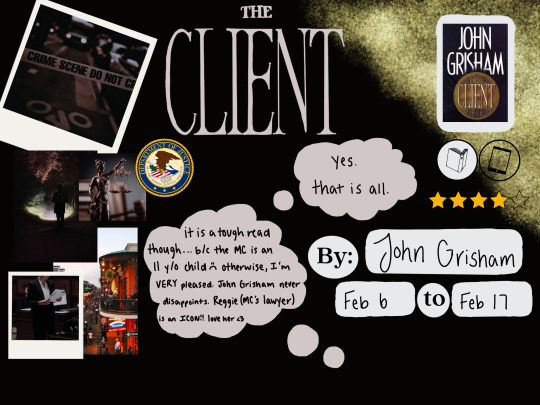
Genre(s): Fiction, Legal Thriller, Mystery, & Suspense
No Spoilers
TW: mention of suicide, PTSD/child trauma
SYNOPSIS:
‘The Client’ by John Grisham follows eleven-year-old Mark Sway after he and his little brother, Ricky, witness a suicide of a well-known lawyer, Jerome Clifford, who was defending a high-profile case involving the murder of Senator Boyd Boyette. Mark and Ricky attempt to put a stop to the suicide attempt, but Mr. Clifford had other plans. Mr. Clifford captures Mark and locks him inside of the vehicle. Mr. Clifford spills a major secret to Mark involving the Boyette case. Mark escapes the locked vehicle with the explosive secret and a hefty choice to make. After the media acknowledges Mark as a witness to the suicide and the police investigate the crime scene, the FBI is on Mark’s tail to reveal what he knows about the case.
Mark retains an amateur lawyer, Reggie Love, to guide him through the high-stakes pressure of the FBI hounding him for information, and the possibility of the Mafia tracking him for potentially holding information that could harm their case. Should Mark spill what he knows to the FBI and chance the Mafia finding him? Or, should Mark keep quiet and play the risky legal system game that could result in serious federal charges? Neither Mark or his lawyer knows the answer to this question. Reggie is willing to go to great lengths to protect Mark from the pressures surrounding him, even if that means both of their lives are in danger.
Mark needs to make a decision, but which will he choose?
READ THIS IF YOU:
Are a fan of ‘Law & Order’
Enjoy thriller books with a little more than just ‘true crime’
Need a page-turning suspense novel that you can’t put down, and when you HAVE to put it down to eat or go to work, you think about it 24/7
CHARACTERS:
This novel has an endless stream of characters with a ton of different FBI agents, Mafia men, Mark’s immediate family, court staff, and hospital staff. For that reason, I will only cover the two main characters, Mark and Reggie.
Mark Sway:
Despite Mark being only eleven years old, his wit and intelligence are far beyond his years. He has lucid moments of not being afraid of anyone or anything, but deep down he is just a kid and it’s comforting to see that he lets his childlike coping mechanisms take over at times. The book takes place over six days…SIX DAYS. The amount of things this child has went through in such a short period of time was tough to read, but he handled it like a champ and ALWAYS focused more on the feelings of those he cared about. His character made this book go the extra mile for me, because I was always thinking ‘What is Mark scheming next?’. He singlehandedly kept me on the edge of my seat.
Reggie Love:
Reggie has lived a troubled life, and that surely did not stop when Mark Sway entered her office. Reggie is a new lawyer and has only practiced for four years, but don’t let that fool you. She is a strong female character and an amazing lawyer. She makes sure to let everyone know that she will not tolerate anyone messing with her or Mark. Much like Mark, Reggie is stuck between a rock and a hard place. She is having trouble advising Mark on his decision, but she supports Mark nonetheless with every decision he makes. Again, Reggie also took this book to the extra mile for me. For Mark, he was now walking in a world with no trust and no allies. Reggie did her absolute best to assure Mark that she was by his side no matter what and I know that is exactly what Mark needed during all of this. I strongly believe that Reggie’s character was flawlessly written.
PRAISES, CRITIQUES, AND MY THOUGHTS:
I like to start my reviews with bad news first, and good news second to end on a happy note. So, first and foremost, my only issue with this book is that the ending was not nearly as exhilarating as I would have hoped. I keep all of my reviews free of spoilers, so I really can’t go into more detail there. I was hoping for an ending with more drama and more suspense. Don’t get me wrong, the ending was not predictable (in my opinion); it was just not as extreme as what I was hoping for out of a suspense novel.
Now with that out of the way, I’m going to explain why I loved this book so much. For starters, this book didn’t NEED a child as the main character. The story could have been written with an adult MC, but the fact that Mark paved the way in ‘The Client’ makes it that much more interesting, albeit upsetting because reading about these events happening to such a young child is devastating. But from a strict “fiction novel reviewer” perspective, I think the difference between child and adult MC was everything.
Second, Reggie Love is an ICON. She is unfettered, which after learning her backstory, was inspiring given all that she has been through. If I ever have legal troubles, I will do my best to find a real-life Reggie Love.
I highly recommend this book, as well as any of John Grisham’s novels, because they always knock it out of the park for me. I’m typically a strict romance reader, but every now and then I need to take romance breaks. During those times, I know that John Grisham will not disappoint. He has yet to prove me wrong there. All of his novels are legal thrillers and follow some sort of legal problem, so if you find interest in the legal system, then John Grisham may be the author you’re missing.
#bookworm#book review#bookblr#reading#john grisham#the client#book journal#digital journal#bookaholic#thriller books#legal thriller
7 notes
·
View notes
Text
In an op-ed for the Wall Street Journal, novelist John Grisham recounts the flawed science that led to the conviction of Robert Roberson (pictured, with his daughter Nikki) and the inadequate legal process that has maintained that conviction. Mr. Roberson was convicted and sentenced to death for the 2002 death of his 2-year-old daughter Nikki. His conviction relied on a theory of “shaken baby syndrome” that has since been discredited. After a hearing ordered by the Texas Court of Criminal Appeals, a Texas judge rubberstamped a brief submitted by Anderson County prosecutors, ignoring exhaustive and unrebutted scientific evidence and upholding Mr. Roberson’s conviction.
Mr. Grisham explains that, although the shaken baby hypothesis has been used to convict “countless caregivers,” “Mr. Roberson could be the first to be executed.” He recounts the circumstances leading up to Nikki’s death – “chronic and severe middle-ear infections,” “a high fever and undiagnosed pneumonia,” and a fall out of bed the night before her father found her unresponsive and took her to the emergency room. Staff there “didn’t know [Mr. Roberson] was autistic and decided he didn’t show the proper emotions given the dire situation.” When Nikki died a few days later, a doctor identified the triad of symptoms that were assumed to be indicative of shaken baby syndrome – “brain bleeding, brain swelling and bleeding in the eyes.”
What Mr. Grisham calls that doctor’s “rush to judgment,” paired with a nurse’s unproven speculation that Nikki had been sexually abused, led a jury to convict Mr. Roberson and sentence him to death. But in the 20 years since Mr. Roberson’s trial, medical science has evolved, and even Dr. Norman Guthkelch, the doctor who initially proposed the shaken baby syndrome hypothesis, has disavowed it. In 2012, Dr. Guthkelch argued for a review of shaken baby convictions, saying, “I am frankly quite disturbed that what I intended as a friendly suggestion for avoiding injury to children has become an excuse for imprisoning innocent people. We went badly off the rails.”
In 2016, just five days before Mr. Roberson was scheduled to be executed, the Texas Court of Criminal Appeals ordered a hearing in his case. The trial court heard ten days of evidence, including testimony from six experts “who showed that the outdated version of shaken-baby syndrome used at his trial has been discredited and that Nikki died as a result of her undiagnosed pneumonia, medications and accidental fall.” According to Mr. Grisham, at that hearing, Mr. Roberson’s legal team “produced unrebutted evidence that no homicide had in fact occurred.” The state replied by submitting “a 17-page brief that hardly touched on the new science—instead rehashing outdated evidence and theories from the original trial in 2003.” Judge Deborah Evans “rubber-stamped it, following the prosecution’s lead in ignoring most of the new expert testimony and all of the scientific studies showing a change in understanding of shaken-baby syndrome.”
Mr. Grisham concludes with a call to review cases like Mr. Roberson’s, and to “demand more from judges than a copy-and-paste job that entirely ignores changes in the scientific understanding of a case, especially when a life is on the line.”
Mr. Roberson has a petition for a writ of certiorari pending before the U.S. Supreme Court. On June 15, 2023, five amicus briefs were filed on his behalf by scientists, judges, and innocence organizations.
#death penalty information center#john grisham#robert roberson#texas#death penalty#anti death penalty
2 notes
·
View notes